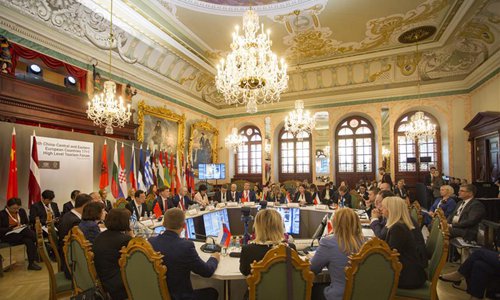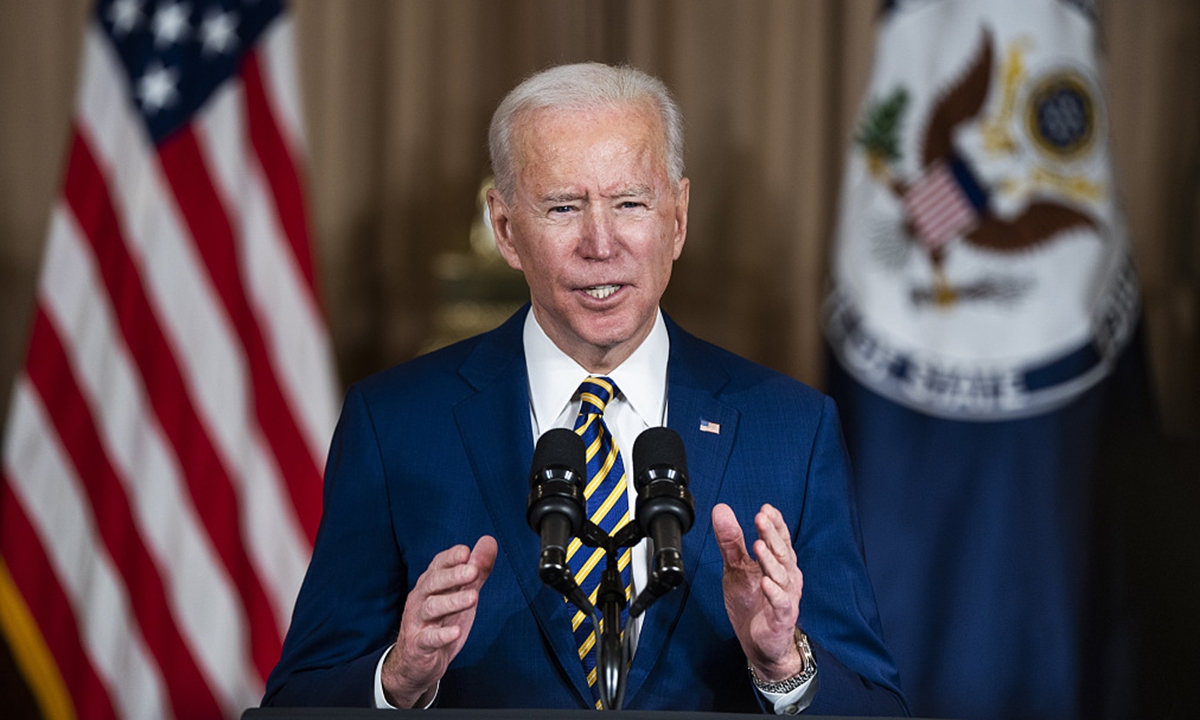
Participants attend the 5th China-Central and Eastern European Countries (CEEC) 17+1 High-level Tourism Forum in Riga, Latvia, on Oct. 23, 2019. (Photo by Edijs Palens/Xinhua)
Tuesday's summit of China and Central and Eastern European Countries (CEECs), which was postponed due to the coronavirus pandemic, signaled the full recovery of cooperation between China and CEECs and will chart the course for economic development of the two sides in the post-pandemic era, Chinese analysts said.
The summit will not only deepen economic, healthcare and people exchange cooperation between China and CEECs, but will also further promote cooperation between China and Europe in sectors including COVID-19 vaccines, analysts said.
They noted that the summit, which comes after new US President Joe Biden took office, will send a message to the US that relations between China and CEECs will remain stable and consistent, and will not be affected by political changes in the US.
Chinese President Xi Jinping will chair the China-CEEC Summit and deliver a keynote speech in Beijing on Tuesday.
The summit, proposed by China, will be held via video link, Foreign Ministry spokesperson Hua Chunying announced on Tuesday.
The summit was originally scheduled for April last year but was postponed due to pandemic.
With several central and eastern European countries showing increased faith in China-produced COVID-19 vaccines, Chinese analysts believe that cooperation on vaccines represents a new direction and new sector for China and CEECs in the post-pandemic era.

A woman receives a dose of the Chinese Sinopharm vaccine as the country begins mass vaccination against COVID-19 in Belgrade, Serbia. Serbia is the first European country to receive and use Chinese vaccines, Serbian President Aleksandar Vucic said on January 16 while welcoming the shipment of 1 million doses of China's Sinopharm inactivated COVID-19 vaccine at the Belgrade Airport. Photo: IC
At least six of the 17 CEECs including Serbia, Hungary, North Macedonia and Montenegro have either purchased Chinese COVID-19 vaccines for their mass inoculation campaigns or expressed an open attitude to buying them.
Among them, Serbia is the first European country to use Chinese vaccines for its mass rollout and Hungary was the first EU country to approve Chinese vaccines for emergency use in January.
In a recent move, Czech Prime Minister Andrej Babis said Friday during a trip to Hungary to consult with authorities on their experiences with Chinese and Russian vaccines that Czech Republic may consider using vaccines not registered in the EU to speed up vaccinations.
"Vaccines are not a political question, but one of safety," Babis said, adding that the origin of a vaccine should not influence decisions on whether to use it, AP reported.
Cui Hongjian, director of the Department of European Studies from the China Institute of International Studies, told the Global Times that CEECs' willingness to work with China in vaccine cooperation is based on a foundation of decades of solid cooperation between the two sides, and represents CEECs' trust in and recognition of Chinese vaccines.
Experts believe that the vaccine cooperation between China and CEECs will help Chinese vaccines reach more European countries.
Huo Yuzhen, Special Representative for Cooperation between China and Central and Eastern European Countries, told the Global Times on Monday that China and CEECs need to strengthen cooperation in health sectors, including research on vaccine and cancer.
Traditional Chinese medicine (TCM) is one field that China and CEECs could deepen cooperation in, Huo said, noting that the fertile lands in CEECs are suitable for collecting and growing Chinese herbs.
"We could establish TCM factories there and then export the TCM to CEECs and other European countries," Huo said.
TCM has been playing an increasingly important role in global efforts to fight COVID-19, with several European countries including Italy and Hungary offering TCM in their treatment of COVID-19 patients in 2020.
Lianhua Qingwen capsules, a form of Chinese herbal medicine that was included in many Chinese cities' COVID-19 treatment programs, have been registered in countries including Romania and Canada, and also obtained temporary permission by Hungary for local coronavirus prevention and control, according to Zhang Boli, an academician with the Chinese Academy of Engineering.
Aside from cooperation in COVID-19 vaccines and the joint anti-pandemic campaign, China and CEECs are expected to deepen cooperation in the digital economy and green development in 2021 and following years, observers noted.
Data from the Chinese Ministry of Commerce (MOFCOM) showed that the country's trade with CEECs exceeded $100 billion for the first time in 2020, with an average growth since 2012 reaching 8 percent each year.
Meanwhile, investment cooperation continues to expand despite the global pandemic. By the end of 2020, Chinese cumulative foreign direct investment in CEEC sectors including energy, infrastructure and logistics totaled $3.14 billion, while those countries' cumulative investments in China reached $1.72 billion, according to MOFCOM.

Bilateral trade volume between China and Central and Eastern European countries topped $100 billion for the first time in 2020. China and the CEECs have also supported each other fighting against COVID-19.Graphic:Jin Jianyu,Chen Xia/GT
Prospects for trade between China and CEECs are promising, following the overall recovery of the Chinese economy this year, as both China's imports and exports from these countries are based on market terms and yield win-win results, said Zhang Hong, a research fellow at the Institute of Russian, Eastern European & Central Asian Studies of the Chinese Academy of Social Sciences.
"What's at the core for CEECs is expanding exports and emerging from this crisis, and thus their economic interests decide the direction of their cooperation with China," Zhang told the Global Times.
In addition to continuously surging China-Europe Railway Express services this year, more digital economy projects are expected to be carried out, as CEEC enterprises find new channels for expanding the Chinese market after the online China-CEECs Expo in Ningbo, East China's Zhejiang Province in June 2020, Zhang said.
Under the "17+1" environment cooperation mechanism, these countries may implement more environmental protection demonstration projects to step up joint exploration of clean energy such as wind and solar, and promote green economic cooperation projects by boosting issuance of green bonds, he said.

Photo: CFP
Signal to the US
The summit came less than one month after US President Joe Biden took office and attempted to mend relations with Europe and bring US-Europe ties closer than they were in the Trump era.
However, Cui said that the mutual interests of China and Europe are enough to resist the influence of a third party, whether it's the US or any other country.
"The summit, held against the backdrop of Biden trying to befriend Europe, sends a signal to the US that the cooperation between China and CEECs will be consistent and won't be affected by political changes in the US," Cui said.
Zhang said that Biden's speech painting China to be the "most serious competitor" of the US and calling for strengthened relations with partners and allies demonstrates his ideology, which will have little impact on cooperation between China and Central and Eastern European countries. "Cooperation with China brings more material benefits to those countries than Biden's slogan," he said.



